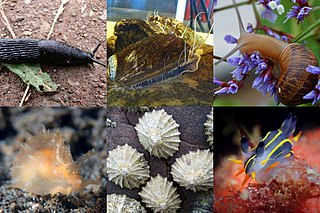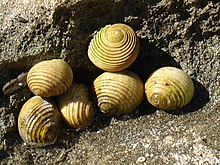
Gastropods, commonly known as slugs and snails, belong to a large taxonomic class of invertebrates within the phylum Mollusca called Gastropoda.

Pulmonata or pulmonates is an informal group of snails and slugs characterized by the ability to breathe air, by virtue of having a pallial lung instead of a gill, or gills. The group includes many land and freshwater families, and several marine families.

Sea snail is a common name for slow-moving marine gastropod molluscs, usually with visible external shells, such as whelk or abalone. They share the taxonomic class Gastropoda with slugs, which are distinguished from snails primarily by the absence of a visible shell.

Hydrocenidae is a taxonomic family of minute land snails or cave snails with an operculum, terrestrial gastropod mollusks or micromollusks in the clade Cycloneritimorpha.

Neritoidea is a taxonomic superfamily of mostly sea snails, nerites and their allies, marine gastropod mollusks in the order Cycloneritida.

Neritopsoidea is a taxonomic grouping, a superfamily of sea snails, marine gastropod mollusks in the clade Cycloneritimorpha, within the clade Neritimorpha,, or in the order Neritoina within superorder Cycloneritimorpha within the subclass Neritimorpha,.
The taxonomy of the Gastropoda as it was revised in 2005 by Philippe Bouchet and Jean-Pierre Rocroi is a system for the scientific classification of gastropod mollusks. The paper setting out this taxonomy was published in the journal Malacologia. The system encompasses both living and extinct groups, as well as some fossils whose classification as gastropods is uncertain.
Daminilidae is an extinct family of fossil sea snails, true limpets, marine gastropod mollusks in the clade Patellogastropoda. This family has no subfamilies.

Neritiliidae is a family of submarine cave snails, marine gastropod mollusks or micromollusks in the clade Cycloneritimorpha.
Pseudorthonychiidae is an extinct, monogeneric family of fossil snails, gastropod mollusks in the clade Cycloneritimorpha.

Phenacolepadidae is a family of small sea snails or false limpets, marine gastropod mollusks in the clade Cycloneritimorpha.

Cerionidae is a family of air-breathing land snails, terrestrial pulmonate gastropod mollusks in the superfamily Urocoptoidea.
The taxonomy of the Gastropoda, as revised by Winston Ponder and David R. Lindberg in 1997, is an older taxonomy of the class Gastropoda, the class of molluscs consisting of all snails and slugs. The full name of the work in which this taxonomy was published is Towards a phylogeny of gastropod molluscs: an analysis using morphological characters.

Vetigastropoda is a major taxonomic group of sea snails, marine gastropod mollusks that form a very ancient lineage. Taxonomically the Vetigastropoda are sometimes treated as an order, although they are treated as an unranked clade in Bouchet and Rocroi, 2005.

Neritimorpha is a clade of gastropod molluscs that contains around 2,000 extant species of sea snails, limpets, freshwater snails, land snails and slugs. This clade used to be known as the superorder Neritopsina.

Lottioidea is a superfamily of sea snails or limpets, marine gastropod mollusks in the clade Patellogastropoda, the true limpets.

Hygrophila is a taxonomic superorder of air-breathing freshwater snails, aquatic pulmonate gastropod mollusks within the clade Panpulmonata.
This overview lists proposed changes in the taxonomy of gastropods at the family level and above since 2005, when the taxonomy of the Gastropoda by Bouchet & Rocroi (2005) was published. In other words, these are recent updates in the way various groups of snails and slugs are classified.

Urocoptoidea is a superfamily of land snails, gastropods in the suborder Helicina.

Cocculinida is an order of deepwater limpets, in the subclass Neomphaliones.















